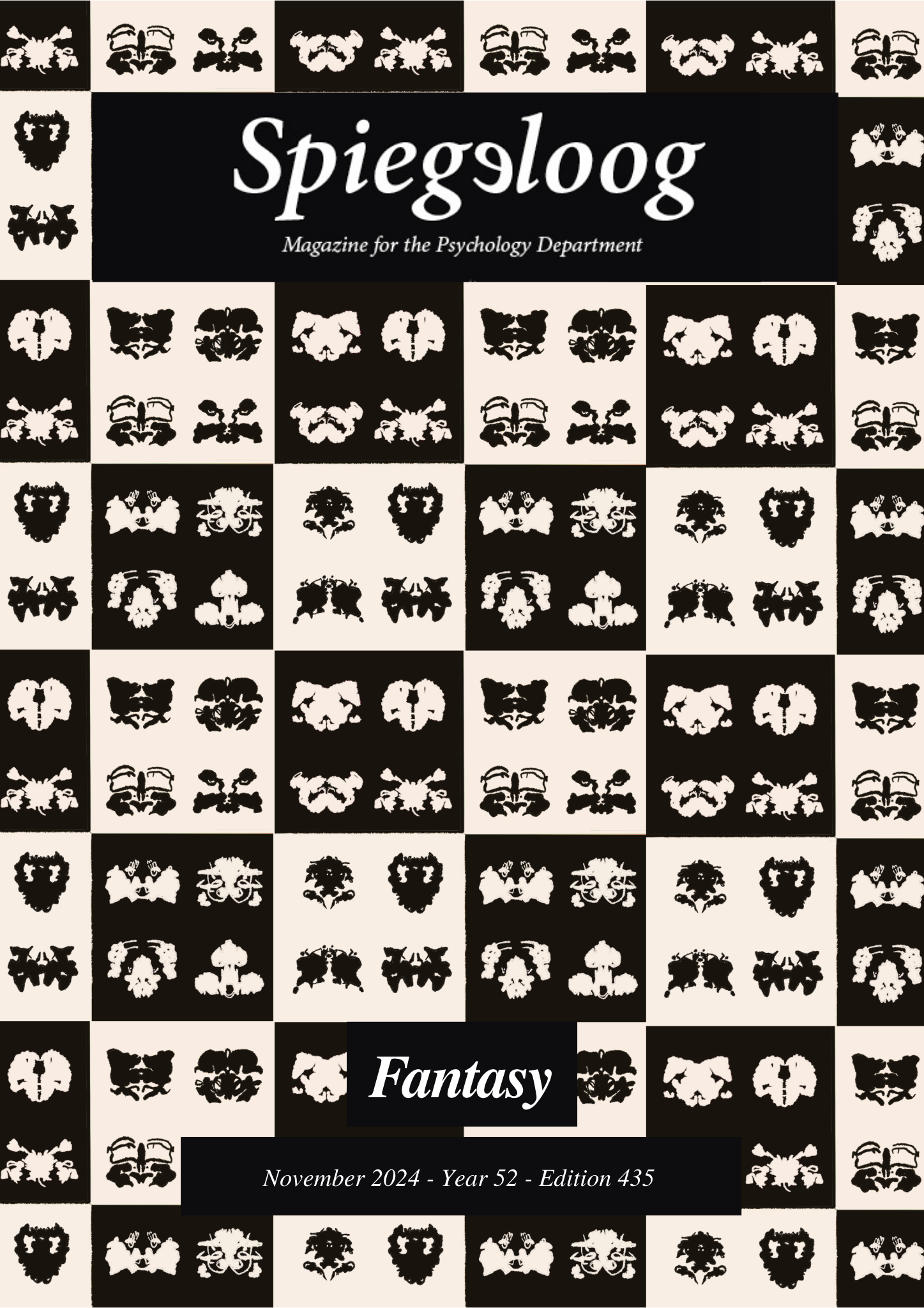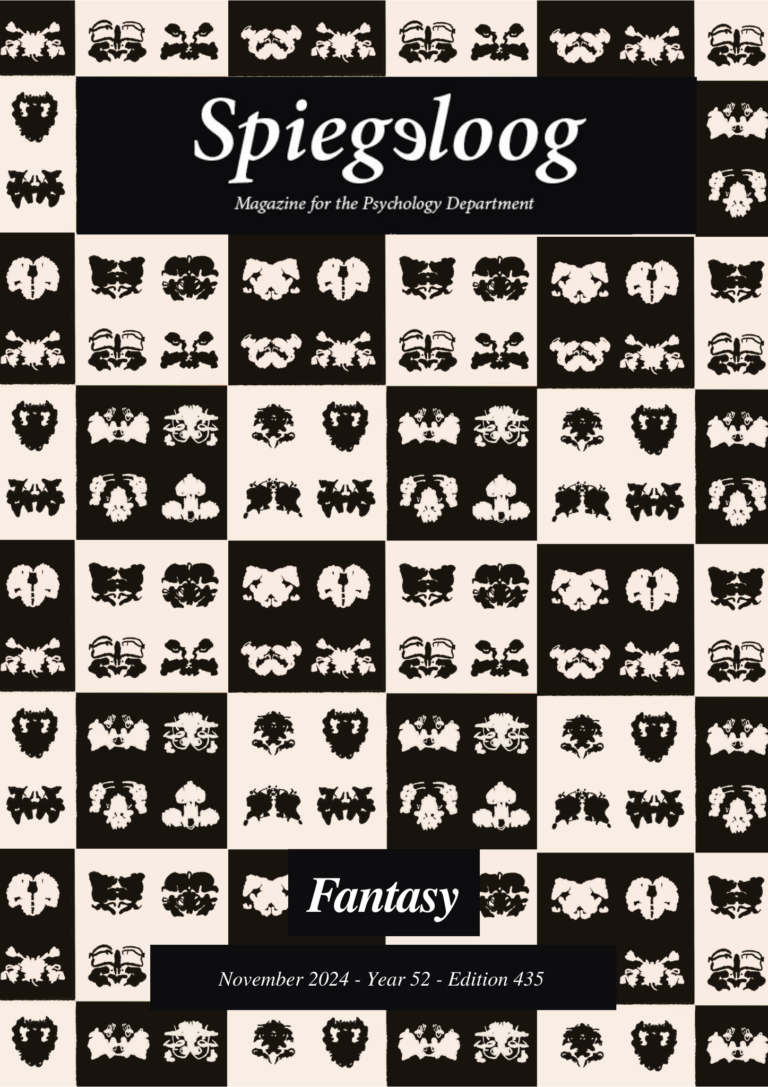
Dear readers,
As we settle ourselves into the new academic year and start getting into predictable routines, we might find ourselves yearning for a touch of magic to break the monotony. Fantasy is a powerful way to explore the intricacies of the human mind and its relationship with reality. It allows us to escape the constraints of our everyday lives, offering a refuge where creativity and imagination can flourish. In this issue, we delve into all things fantastical, examining the role of fantasy in shaping our thoughts, behaviors, and even our identities. Join us as we embark on this captivating journey through Spiegeloog 435: Fantasy.

What hidden roles do daydreaming, fantasizing, and dreaming play in our lives? How do these mental escapes shape our emotions, creativity, and even relationships? Hanna licks off the issue by exploring how these seemingly simple processes help us reflect, escape, and connect—while reminding us of the importance of balance between imagination and reality. Next, Nicole questions how schizophrenia reshapes the boundaries between personal and shared reality, challenging us to rethink what defines ‘real’, and how can one person’s truth feel like fantasy to another. Evita S. follows with delving into another fascinating question: Can the brain handle absolute silence? She explores how sensory deprivation exposes the mind’s hidden mechanisms, transforming absence into vivid mental landscapes.
This issue’s Tabula Rasa by Anda features Murakami’s classic ‘Kafka on the Shore’, which navigates fantasy not as an escape but as a reflection of inner consciousness, and fantasy becomes a conduit for self-discovery. In her article, Ula tackles the present-day concerns of overstimulation, distraction, and abundance, and questions whether they could be robbing us of true contentment. Next, Brage writes about one-and-a-half sided relationships – exploring the psychology of parasocial relationships on Twitch, and how they blur the lines between reality and illusion now more than ever. Sara delves into a different aspect of digital fantasies, in her column about art created by AI, which questions what it means to be an artist, and more fundamentally, what it means to be human.
Anika wonders why fantasy worlds, meant for escapism, still mirror our real-life struggles and conflicts. She explores how the genre’s enchanting yet grounded narratives help us grow alongside our favorite heroes. Through an engaging interview about fanfictions, Linda explores what draws fans to expansive universes around beloved characters, revealing the power of storytelling in enriching cherished narratives. Next, Katarina tackles head-on the debate about the behavioral addiction to daydreaming – navigating whether daydreaming could be more than just a fleeting escape. Belle rounds up the issue with here Bacchus on the relentless pursuit of an ideal and how it can obscure the beauty of what already surrounds us.
Enjoy the new issue!
Shriya and Jules
Dear readers,
As we settle ourselves into the new academic year and start getting into predictable routines, we might find ourselves yearning for a touch of magic to break the monotony. Fantasy is a powerful way to explore the intricacies of the human mind and its relationship with reality. It allows us to escape the constraints of our everyday lives, offering a refuge where creativity and imagination can flourish. In this issue, we delve into all things fantastical, examining the role of fantasy in shaping our thoughts, behaviors, and even our identities. Join us as we embark on this captivating journey through Spiegeloog 435: Fantasy.

What hidden roles do daydreaming, fantasizing, and dreaming play in our lives? How do these mental escapes shape our emotions, creativity, and even relationships? Hanna licks off the issue by exploring how these seemingly simple processes help us reflect, escape, and connect—while reminding us of the importance of balance between imagination and reality. Next, Nicole questions how schizophrenia reshapes the boundaries between personal and shared reality, challenging us to rethink what defines ‘real’, and how can one person’s truth feel like fantasy to another. Evita S. follows with delving into another fascinating question: Can the brain handle absolute silence? She explores how sensory deprivation exposes the mind’s hidden mechanisms, transforming absence into vivid mental landscapes.
This issue’s Tabula Rasa by Anda features Murakami’s classic ‘Kafka on the Shore’, which navigates fantasy not as an escape but as a reflection of inner consciousness, and fantasy becomes a conduit for self-discovery. In her article, Ula tackles the present-day concerns of overstimulation, distraction, and abundance, and questions whether they could be robbing us of true contentment. Next, Brage writes about one-and-a-half sided relationships – exploring the psychology of parasocial relationships on Twitch, and how they blur the lines between reality and illusion now more than ever. Sara delves into a different aspect of digital fantasies, in her column about art created by AI, which questions what it means to be an artist, and more fundamentally, what it means to be human.
Anika wonders why fantasy worlds, meant for escapism, still mirror our real-life struggles and conflicts. She explores how the genre’s enchanting yet grounded narratives help us grow alongside our favorite heroes. Through an engaging interview about fanfictions, Linda explores what draws fans to expansive universes around beloved characters, revealing the power of storytelling in enriching cherished narratives. Next, Katarina tackles head-on the debate about the behavioral addiction to daydreaming – navigating whether daydreaming could be more than just a fleeting escape. Belle rounds up the issue with here Bacchus on the relentless pursuit of an ideal and how it can obscure the beauty of what already surrounds us.
Enjoy the new issue!
Shriya and Jules



